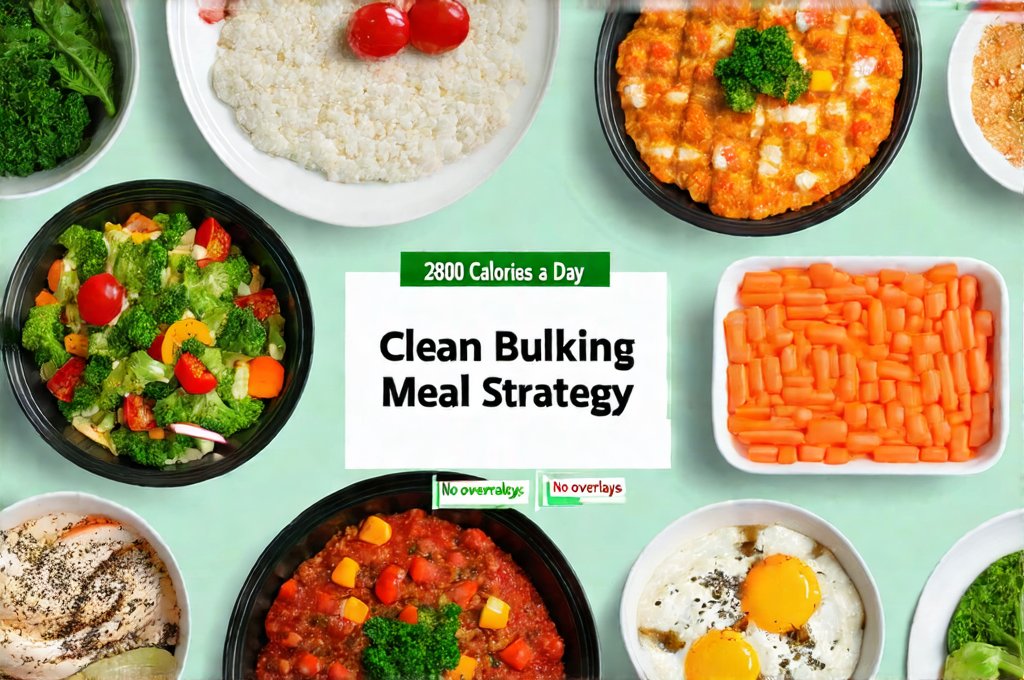The pursuit of muscle growth, often called “bulking,” is a common goal for many fitness enthusiasts. However, simply eating more isn’t enough. A successful bulking phase requires strategic planning, focusing on nutrient-dense foods and a controlled caloric surplus. Many find that aiming for around 2800 calories per day provides a sweet spot – sufficient energy to support muscle protein synthesis without excessive fat gain, when implemented correctly. This approach, known as “clean bulking,” emphasizes quality over quantity, prioritizing whole, unprocessed foods to fuel your body and optimize results. It’s about building lean mass, not just adding weight indiscriminately.
This article will delve into a comprehensive meal strategy for a 2800-calorie clean bulk. We’ll break down macronutrient targets, provide sample meal ideas, and offer practical tips to help you stay on track. Remember that these are general guidelines; individual needs vary based on factors like activity level, genetics, and metabolism. It’s important to listen to your body and adjust accordingly. Clean bulking isn’t a race – it’s about sustainable progress and building a strong foundation for long-term fitness.
Macronutrient Breakdown & Calorie Allocation
A 2800-calorie diet necessitates careful macronutrient distribution to maximize muscle growth and minimize unwanted fat gain. A generally effective split is around 40% carbohydrates, 30% protein, and 30% fats. This translates roughly to:
* Carbohydrates: 280g (1120 calories) – Focus on complex carbs for sustained energy.
* Protein: 210g (840 calories) – Essential for muscle repair and growth.
* Fats: 93g (840 calories) – Important for hormone production and overall health, prioritize healthy fats.
This is a starting point. Active individuals or those with faster metabolisms might benefit from slightly higher carbohydrate intake, while others may find success with minor adjustments to protein or fat ratios. The key is consistency in tracking your intake and observing how your body responds. Don’t be afraid to experiment within these ranges to find what works best for you. Remember that calorie counting is a tool, not a rigid rule. Focus on building habits around whole foods first, then refine the numbers as needed.
Beyond macronutrients, micronutrient intake is critical. Ensure adequate vitamin and mineral consumption through a varied diet rich in fruits, vegetables, and quality protein sources. Consider supplementing with a multivitamin if necessary, but prioritize obtaining nutrients from food whenever possible. Hydration is also paramount – aim for at least 3 liters of water per day to support digestion, nutrient absorption, and overall performance.
Sample Meal Plan (2800 Calories)
Here’s an example of what a daily meal plan might look like on a 2800-calorie clean bulk. This is just one possibility; feel free to swap out foods based on your preferences and dietary needs:
- Breakfast (550 calories): Oatmeal (75g dry weight) with berries (1 cup), protein powder (30g), and almond butter (2 tbsp).
- Mid-Morning Snack (300 calories): Greek yogurt (200g) with a handful of almonds.
- Lunch (700 calories): Chicken breast (150g) with brown rice (1 cup cooked) and steamed broccoli (1.5 cups).
- Pre-Workout Snack (250 calories): Banana with peanut butter (2 tbsp).
- Post-Workout Meal (600 calories): Salmon (150g) with sweet potato (1 medium) and green beans (1 cup).
- Evening Snack (400 calories): Cottage cheese (250g) with a small handful of walnuts.
This meal plan emphasizes lean protein sources, complex carbohydrates, and healthy fats. It’s also designed to provide sustained energy throughout the day. Notice how it incorporates snacks – these are crucial for maintaining consistent calorie intake and preventing excessive hunger. Portion control is essential, even when bulking. Using a food scale and tracking your meals can be incredibly helpful in staying on target.
Optimizing Food Choices
The foundation of clean bulking lies in prioritizing whole, unprocessed foods. This means:
* Focusing on lean protein sources such as chicken breast, turkey, fish (salmon, tuna), eggs, and Greek yogurt.
* Choosing complex carbohydrates like brown rice, quinoa, sweet potatoes, oats, and whole-wheat bread.
* Incorporating healthy fats from sources like avocados, nuts, seeds, olive oil, and fatty fish.
Avoid processed foods, sugary drinks, excessive saturated and trans fats, and empty calories. These offer little nutritional value and can hinder your progress. While occasional treats are fine in moderation, they shouldn’t be a significant part of your diet. Prioritize nutrient density – choose foods that provide the most vitamins, minerals, and antioxidants per calorie.
Hydration & Supplementation Considerations
Staying adequately hydrated is crucial for optimal performance and recovery. Aim to drink at least 3 liters of water throughout the day, especially around workouts. Electrolyte imbalances can occur during intense training, so consider adding an electrolyte supplement or consuming sports drinks with low sugar content if needed. However, water should always be your primary source of hydration.
Regarding supplementation, a few key supplements may support your clean bulk:
* Creatine: A well-researched supplement that enhances strength and muscle growth.
* Protein Powder: Convenient for supplementing protein intake, especially post-workout.
* Multivitamin: To address any potential micronutrient deficiencies.
Remember that supplements are additions to a healthy diet – they shouldn’t replace whole foods. Always consult with a healthcare professional before starting any new supplement regimen.
Tracking Progress & Adjusting Your Strategy
Consistent tracking is vital for assessing the effectiveness of your bulking strategy. Monitor your weight, body composition (if possible), and energy levels regularly. If you’re not gaining muscle or are gaining too much fat, adjust your calorie intake accordingly. A small surplus is preferable to a large one – aim for 0.5-1 pound of weight gain per week.
Don’t solely rely on the scale. Pay attention to how your clothes fit and how you feel during workouts. If you’re feeling sluggish or bloated, it might be a sign that you need to adjust your diet or training routine. Be patient and consistent. Building muscle takes time and effort. Don’t get discouraged by setbacks – simply learn from them and keep moving forward. The most successful clean bulking strategies are those that are sustainable in the long term.




